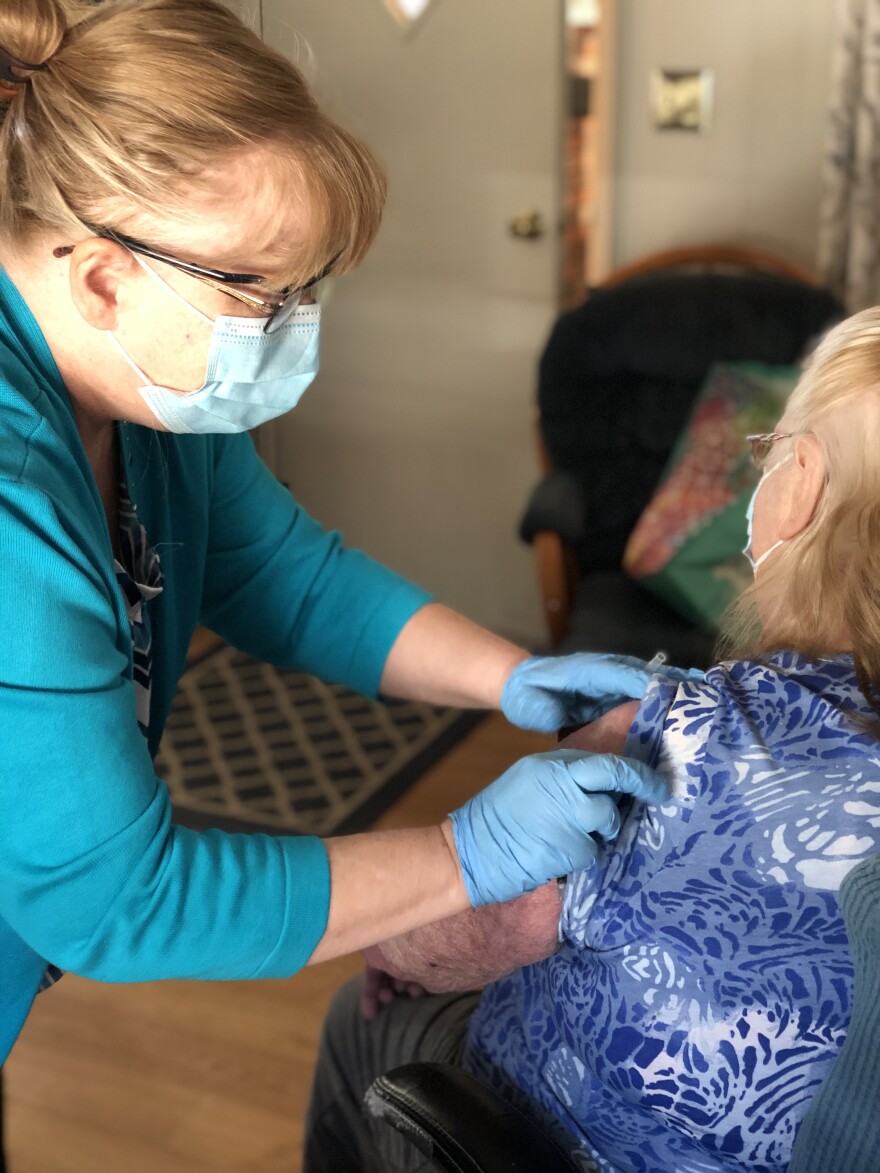The state has managed two mass COVID-19 vaccination clinics in recent weeks at the New Hampshire Motor Speedway in Loudon, a site all about efficiency and scale. But there are sectors of the population that are much harder to reach. That includes many homebound residents.
And that's where June Gallup comes in. Gallup is a manager with Cornerstone VNA, a home, health and hospice organization in Rochester. Her official title is “Quality Improvement Director.”
But her co-workers say these days, she’s “The COVID Queen.”
Gallup herself, puts it more formally: “the COVID coordinator.”
Whatever her title, she's been busy lately.

The VNA has around 700 patients, and Gallup says 188 are getting the vaccine at home.
You may think a population that spends most of their time at home is safer than most. But Gallup says that's not the case. Many have health conditions that make them vulnerable to COVID-19.
"And there's still people coming in and out of their house," Gallup said. "And we've had a lot of patients that have gotten COVID-19 from family members because they're out and about in the world, and they're bringing it into grandma."
That adds some urgency to her work, Gallup says. On a recent morning in the parking lot of the VNA, she held a small blue cooler, full of Pfizer vaccine vials.
"Once we puncture that vial, I have six hours to get that vaccine into arms."
Six hours may seem plenty of time to empty a vial that contains six doses of the vaccine. But add the drive time to each individual home, a 15 to 30 minute wait after the shot to make sure the patient doesn’t suffer any adverse effects, then time to answer questions: It adds up. Gallup tries to inject one patient every 45 minutes, compared to around 500 an hour at mass-vaccination sites like the New Hampshire Motor Speedway.
On the day I'm with her, Gallup is planning to visit six homes that are all nearby, to be as efficient as possible. The first is in Farmington at the home of Audrey Moores, who’s 83.
Moores was confused about the time of the appointment. But after a few minutes she emerges with her walker, dressed and ready for the vaccine.
Gallup gets her comfortable, in a blue desk chair. They go through a few standard questions, as Gallup gets the vaccine ready.

First, the shot. Then, the waiting. Moores uses the time to get all her COVID related questions and concerns answered, from possible arm soreness, to questions around her family’s safety and mask wearing habits.
Gallup is full of answers, and Moores is grateful. Both for the answers, and also that all of this can happen in her home.
"And I kept thinking, how am I going to get to a clinic to get my shot," Moores said. "And when they told me I could get it at home, I was very happy. It’s made a world of difference."
While exact numbers are hard to come by, the state says there are at least 10,000 homebound residents and probably a lot more. Granite Staters are defined as homebound because of their health or medical condition or because of transportation barriers. Many in this population did receive the vaccine at senior housing clinics early on, or were driven to a site by a family member. But the remainder can be especially hard to reach.
“These challenges already existed for North Country residents," said Kris Van-Bergen with the North Country Health Consortium, one of the 13 regional public health networks in the state. “They are the inequities that we're looking at, the poverty, the age, the level of chronic disease burden, and they're just exacerbated through something like a public health emergency.”
So the challenges around vaccine access are just one piece of the puzzle. If homebound residents are not associated with a home care agency or some other social service organization, the onus is on them, or their family members, to call 2-1-1 and schedule an appointment. That’s where they’re asked about another big access issue: transportation. That's a particular challenge in the North Country.
“We do not have public transport," Van-Bergen said. "So transportation becomes a barrier to accessing health resources.”
Van-Bergan says her organization screens people for a homebound vaccine, and while she says the goal is always to “screen in” for a vaccine at home, sometimes all people need is a ride.
Brenda Gagne, transit director for the non-profit Tri County Community Action Program, said the region’s transportation needs have changed dramatically in the pandemic. Vaccine appointments are another new challenge one for the agency. They’ve been coordinating with the region’s COVID-19 committee, which includes local hospitals and the health department.
"If they have a person who is either disabled or elderly, unable to get to a vaccination site on their own, we work with them, schedule their trip, pick them up, take them to the site, take them back home," Gagne said.
While the general population is signing up their appointments this week, vaccines for the homebound in Phase 1B continue.








